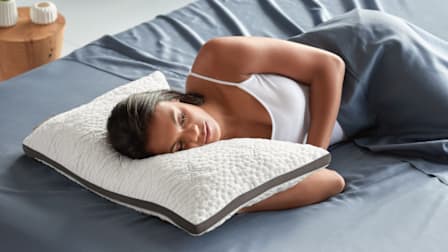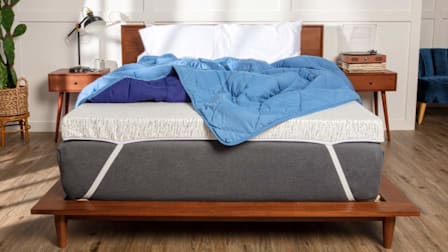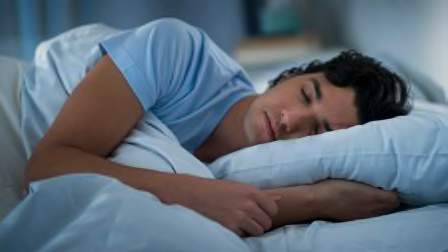Simple Strategies for Better Sleep
Making a few changes in your day can mean you get your zzz’s and wake up more refreshed

"Sweet dreams” is a common refrain when you’re headed to bed, but by all accounts, our slumber is anything but sweet these days. In normal times, about 50 percent of older adults in the U.S. meet the criteria for having a sleep disorder, and what’s been dubbed COVID-somnia has only made things worse. According to a survey from the American Academy of Sleep Medicine, 32 percent of Americans ages 65 and older reported an increase in sleep problems since the start of the pandemic.
Many factors may be involved. “When you worry more before falling asleep, you’re more likely to wake up in the middle of the night,” says Jennifer Ailshire, Ph.D., an associate professor of gerontology and sociology at the University of Southern California. “If you have feelings of depression, you tend to have worse sleep. If you’ve felt lonelier and more disconnected, which has been common in both older and younger adults, you could have more problems sleeping as well.”
Changes in routine are another possible cause, says Rachel Salas, M.D., a professor of neurology at Johns Hopkins Medicine. “Many people are working from home,” she says. “They may be working in their bedroom and even in their sleep ‘uniform’ [aka pajamas]. There’s no separation between work and sleep.”
When it comes to addressing the problem, the first and foremost task is making sleep a priority. “In our culture, people are more willing to sacrifice sleep time to finish the TV show they’re bingeing or check their social media or email,” Salas says. “We’re willing to let electronics in [to the bedroom] even though we’re tired.”
Whatever it is that’s keeping you awake, there are changes you can make throughout the day that can pay off at bedtime.
Rev Up in the Morning
Wake at the same time—consistently. “The timing of your sleep-wake schedule is more important than getting 7, 8, or 9 hours,” Salas says. “Studies have shown that even if you get enough sleep but it’s not in line with your circadian rhythm and it’s variable, you can still function as if you’re sleep deprived.”
Getting up and going to bed at the same time every day helps coordinate your circadian rhythms. But those times may not be the same as they were when you were younger, notes Ronald Chervin, M.D., a neurologist and the director of the Michigan Medicine Sleep Disorders Centers, so you may need to experiment to see what works best for you.
Activity in the Afternoon
Break a sweat. “Some health issues that become more prominent with age can contribute to sleep troubles,” Ailshire says. Exercise helps improve all of your body’s systems, and the healthier you are, the less likely you are to experience health conditions that interfere with sleep, such as sleep apnea (short pauses in breathing during sleep) and depression.
In a study published in Sleep Medicine, formerly sedentary adults 55 years and older followed better sleep advice (such as using their bed only for sleep and sex) and did aerobic exercise three days a week for 16 weeks or just followed the sleep tips. The exercise group reported sleeping 45 minutes longer on average, had more energy, and were more likely to exercise following a good night’s sleep.
A 2017 review of three meta-analyses published in the Journal of Evidence Based Medicine found that exercise helped reduce the number of sleep apnea episodes and increase the ability to fall asleep. “There was a 19 percent improvement in overall sleep quality—getting consistent sleep on a daily basis—in those who exercised,” says George Kelley, a co-author of the study and director of the Meta-Analytic Research Group in the School of Public Health at West Virginia University.
Nix the caffeine. Stop drinking coffee, tea, or other caffeinated beverages at least 6 hours before bedtime to avoid any residual energizing side effects, Chervin says.
Get outside if you tire early. Many older adults find themselves waking up earlier than they used to, which isn’t necessarily a problem unless it starts to disrupt your life. When you’re going to bed at 6 or 7 p.m. because you’re waking at 2 or 3 a.m., that can make it more difficult to interact with family and friends, which can increase isolation. Getting light exposure in the later afternoon “can help push that sleepiness back so you can go to bed later and get up a little later,” Chervin says.
The Evening Wind Down
Dine lighter. Eating too much or too late can lead to acid reflux or just feeling uncomfortable. “Your body is trying to digest food when the circadian system is not geared to be receiving food,” Reid says. “It has cardiometabolic implications [contributing to diabetes and obesity, in particular] and implications for sleep.” Have a light dinner, and stop eating at least 2 hours before bed.
But don’t go to bed hungry. Hunger can wake you up, Salas says. If you’ve experienced this, try having a light bedtime snack, like warm milk or fruit.
Watch what you’re drinking. “We suggest no alcohol close to bedtime, but one drink with dinner probably won’t make a big difference,” Chervin says. “Alcohol acts as a hypnotic for the first few hours, but then you wake up and can’t go back to sleep. It can also worsen untreated sleep apnea.”
Create a snoozing ritual. “Our brain needs cues for when bedtime is,” Salas says. Dim the lights, put on your pajamas, do meditation, or write in a journal. All these help you wind down and signal the brain that it’s sleepy time.
Research has found that waking up and going to bed at the same time is more important than aiming to get 7, 8, or 9 hours of sleep each night.
Editor’s Note: A version of this article also appeared in the July 2021 issue of Consumer Reports on Health.




